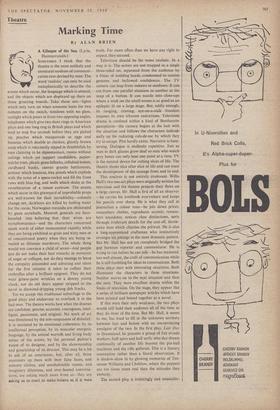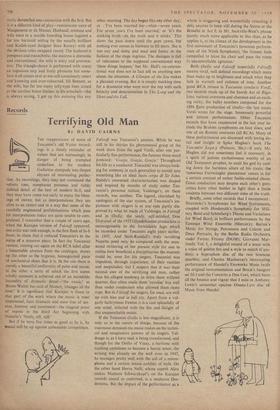Theatre
Marking Time
By ALAN BRIEN
SOMETIMES I think that the theatre is the most unlikely and unnatural medium of communi- cation ever devised by man. The word 'realistic' can only be used metaphorically to describe the events which occur, the language which is uttered, and the objects which are displayed up there on those groaning boards. Take, those sets—lights which only turn on when someone leans for two minutes on the switch, windows with no glass, sunlight which pours in from two opposing angles, telephones which give two short rings in American plays and one long ring in British plays and which tend to stop five seconds before they are picked up, peaches which masquerade as eggs and bananas which double as chicken, ghastly brown soup which is reluctantly sipped in thimblefuls by men claiming to be dipsomaniacs, rooms without ceilings which yet support candelabra, papier- milché trees, plastic grass hillocks, celluloid babies, cardboard books, canvas granite battlements, armour which bounces, tiny pistols which explode with the noise of a space-rocket and fill the front rows with blue fog, and walls which shake at the reverberation of a raised eyebrow. The events which occur in this graveyard of improbable props are well-known for their incredibility—colonels change sex, deckboys are killed by boiling water for the cocoa, Norwegian messiahs are obliterated by giant snowballs, Moorish generals are barn- ' boozled into believing that their wives are nymphomaniacs—and the characters concerned speak words of either monumental vapidity while they are being exhibited as great and witty men or of concentrated poetry when they are being re- vealed as illiterate murderers. The whole thing would not convince a child of seven—real people just do not make their best remarks in moments of anger or collapse, nor do they manage to leave the company astounded and admiring and silent for the five minutes it takes to collect their umbrellas after a brilliant epigram. They do not wear grease-paint wrinkles on a downy young cheek, nor do old dears appear stripped to the navel in diamond-dripping young deb frocks.
Yet we accept this traditional subterfuge in the good plays and endeavour to overlook it in the bad ones. The theatre works best when the dramas are confident, precise, accurate, courageous, intel- ligent, passionate, and original. No work of art was threatened by the non-suspension of disbelief. It is insulated by its emotional coherence, by its intellectual perception, by its muscular energetic language, by the animal warmth and living body odour of the actors, by the personal painter's vision of its designer, and by the showmanship and generalship of its director. This may be a lot to ask of an entertainer, but, after all, those mummers up there with their false faces, and unworn clothes, and uninhabitable rooms, and imaginary dilemmas, and over-heated conversa- tions, are asking much more from us—they are asking us to react to make-believe as if it were truth. Far more often than we have any right to expect, they succeed.
Television should be far more realistic. In a way it is. The actors are not trapped in a single three-sided set, separated from the audience by a frieze of nodding heads, condemned to outsize gestures and bellowed confidences. The TV camera can leap from indoors to outdoors. It can cut from one parallel situation to another at the snap of a button. It can nuzzle into close-ups where a wink on the small screen is as good as an epileptic tit on a large stage. But, oddly enough, its ranging, craning, eye-on-a-stalk freedom imposes its own irksome restrictions. Television drama is confined within a kind of Benthamite panopticon—the camera begins at the hub with the situation and follows the characters individ- ually up the radiating culs-de-sac by which they try to escape. Plot hardly exists. Narrative is ham- strung. Dialogue is endlessly repetitive. Just as men in dark glasses grow deaf so men who watch grey boxes can only hear one point at a time. TV is the natural device for cutting slices of life. The theatre shows slice after slice of life and can trace the development of the sausage from end to end.
This analysis is not entirely irrelevant. Willis Hall's two one-act plays were originally written for television and the theatre projects their flaws on a large canvas. Mr. Hall is first of all an observer —he carries his notebook everywhere and keeps his pencils ever sharp. He is what they call in journalism a colour man—he jots down prices, remembers clothes, reproduces accents, remem- bers ancedotes, notices class distinctions, sorts through irrelevant details for the cast-off, throw- away item which clinches the portrait. He is also a long-apprenticed craftsman who instinctively arranges his jottings in the most dramatic pattern. But Mr. Hall has not yet completely bridged the gap between reporter and commentator. He is trying to run before he can talk—he has mastered, too well almost, the craft of communication while he is still fumbling for ideas to communicate. Both these plays start with interesting situations. Both illuminate the characters in these situations. Neither moves on tt, the next situation and then the next. They were excellent drama within the limits of televisiOn. On the stage, they appear like a series of brilliant newspaper.articles which have been printed and bound together as a novel.
If this were their only weakness, the two plays would still hold their audience all of the time as they do most of the time. But Mr. Hall, it seems to me, has tried to fill in the unknown territory between fact and fiction with an unconvincing amalgam of the two. In the first play, Last Day in Dreamland, he presents a group of fun arcade workers, half spivs and half serfs, who day-dream continually of another life beyond the pin-ball machines and the rifle galleries. This is a literary convention rather than a literal observation. It is shadow-show lit by glowing memories of Ten- nessee Williams and Chekhov, where the puppets are ten times more real than the attitudes they embody.
The second play is irritatingly and unsatisfac- torily dovetailed into connection with the first. But it is a different kind of play—reminiscent more of Maupassant or de Musset. Husband, mistress and wife meet in a seaside boarding house (against a far too baronial setting by the usually brilliant and Kodak-eyed designer Sean Kenny) with all the obvious roles swapped round. The husband is pompous and masochistic, the mistress is domestic and conventional, the wife is witty and provoca- tive. The triangle-dance is performed with many an ingenious step and lively pirouette but some- how it all comes over as too self-consciously smart and knowing and over-rehearsed. Jill Bennett, as the wife, has far too many telly-type lines aimed at the careless home listener in his armchair—she is always saying, 'I got up this morning like any other morning. The day began like any other day,' or : Tye been married for—:-what—seven years. For seven years I've been married,' or 'It's the stinking truth—its the truth and it stinks.' This slows the pace down until the gaps yawn, but nothing ever comes in between to fill them. She is too coy and dotty and mad and funny in the fashion of the stage ingenue. The dialogue is full of references to the supposed conventional way `these things happen,' but Mr. Hall's unconven- tional way does not in fact tell us anything new about the situation. A Glimpse of the Sea makes a pleasant evening. But it is simply marking time for a dramatist who went over the top with such ferocity and determination in The Long and the Short and the Tall.







































































 Previous page
Previous page